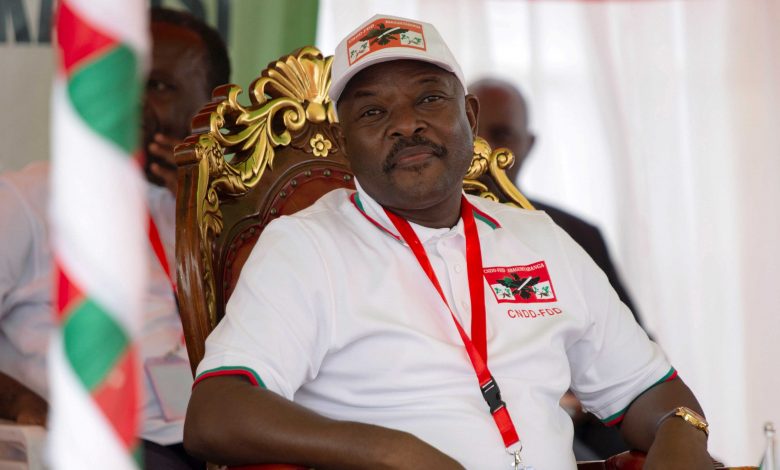Burundi Buries President Nkurunza Who Scoffed At COVID-19 But Died of The Pandemic

On Friday, June 26, Burundi, in Southern Africa buries President Pierre Nkurunza with fanfare and pageantry. The programme of the event calls for mass mobilization of citizens to line the routes along the 58 kilometers Karuzi-Gitega road.
His death seems to signal a rebuke to those who continue to live in denial of the COVID-19 pandemic. Nevertheless, it does not look like there is any national sense of apprehension given that late President Nkurunza who threw caution and informed medical advisory on the raging coronavirus to the wind is now the subject of national mourning.
Massive crowd in Gitega, the new Burundian capital and Karuzi in the central province of the state is expected to pour out into the streets. Indeed, for this reason, the state has declared Friday a public holiday. The funeral obsequies will be held at the Karuzi hotel.
There will be a full display of Military parade and honors by the Burundian Defence and Security Forces as part of the rite of tribute to the fallen commander-in-chief. A public event at the massive sports stadium in Gitega features as part of the programme.
President Nkurunza died at the age of 55. He ascended the exalted office of presidency at 40 years of age. He will finally be committed to earth in a cemetery located on the outskirts of the village of Gitega, far from his hometown, Ngozi in the Northern province.
Nkurunziza died two months before the inauguration of his successor, Evariste Ndayishimiye, elected on May 20.
A seven-day national mourning was declared. The national flag is on a half-mast and state radio and televisions are rendering somber, religious melodies over the airwaves as part of the subdued national mood.
Controversial end to Covid-19 denial
President Nkurunziza reportedly died of Covid-19, according to diplomatic sources in Bujumbura and Nairobi. The Burundi government however attributed Nkurunziza’s sudden death to heart attack.
It is a tragic end to a man who denied, in the first place, that COVID-19 ever existed in his home turf.
“He had coronavirus but no one would say so because the president had played it down all along,” a western diplomat based in Bujumbura told a local newspaper, Star.
Before his death, Denise Nkurunziza, his wife, was flown to Nairobi to seek medical treatment for an undisclosed ailment.
However, it was later confirmed that she had contracted the Covid-19. She eventually received successful medical attention and was flown back to Burundi after news of her husband’s death broke out.
Like Tanzanian President John Magufuli, Pierre Nkurunziza refused to impose lockdowns or restrictions in Burundi. Competitive sports and leagues were in full swing as well as mass political rallies.
On June 6, the day he fell ill, according to the government statement, Nkurunziza attended a game of volleyball but fell ill that night and was taken to hospital.
It was reported at the time that his poor health situation bore the signs of the coronavirus. According to people close to the president he showed one of the main signs, respiratory problems, as he struggled to breathe.
Reports indicate that he appeared to recover the following day and spoke with people around him. But his condition deteriorated dramatically the very next morning and he passed on.
“On the morning of Monday June 8, 2020, his health suddenly deteriorated and he had a heart attack,” declared a government statement.
Covid-19 left a dent in his family circle, as apart from his wife, his other close family members have been infected by the disease.
Burundi, a nation of 11 million people, has reported less than 100 COVID-19 cases and officials have leaned more on religious premise as a basis to combat the pandemic over scientific protocols.
Nkurunziza’s spokesperson said that although the country may be hit by the pandemic, “Burundi … has signed a special covenant with God, whether you believe it or not.”
In May, the Burundi government expelled the representatives of the World Health Organization, (WHO) amid criticisms of the government’s handling of the pandemic.
Loved and feared
Nkurunziza was loved by those who felt he lived up to his promises when he was elected after the civil war and feared by his political opponents.
When the former rebel leader took office in 2005 at the age of 40, the country had been brutally torn apart by ethnic conflicts that consumed about 300,000 in a span of a decade.
Young, optimistic and charismatic, he managed to live up to everyone’s expectations by uniting people and rebuilding the economy. Between 2006 and 2011, the president was hailed internationally for ushering in a peacebuilding process.
A decade into his leadership, his reputation suffered abysmally when he campaigned for a referendum to give him a third term as president. Despite suspicions that he planned to stay on for a fourth term, he did not stand in elections in May, which were held despite the coronavirus.
The elections were won by Gen Évariste Ndayishimiye. He is slated to assume office in August, but to avert a power vacuum the transition was accelerated with his inauguration last week.
As in death as in life, Pierre Nkurunziza remains a deeply divisive and controversial figure. So, now the country and the people mourn his passing as well as cry for thousands of victims during his reign.
Support Our Journalism
There are millions of ordinary people affected by conflict in Africa whose stories are missing in the mainstream media. HumAngle is determined to tell those challenging and under-reported stories, hoping that the people impacted by these conflicts will find the safety and security they deserve.
To ensure that we continue to provide public service coverage, we have a small favour to ask you. We want you to be part of our journalistic endeavour by contributing a token to us.
Your donation will further promote a robust, free, and independent media.
Donate HereStay Closer To The Stories That Matter




